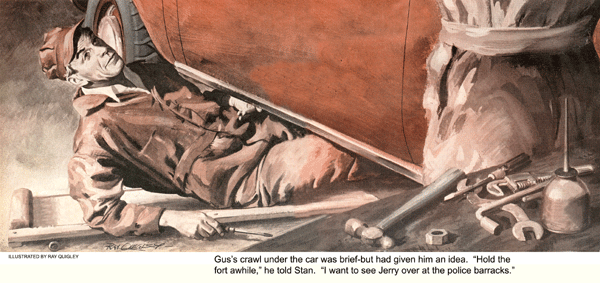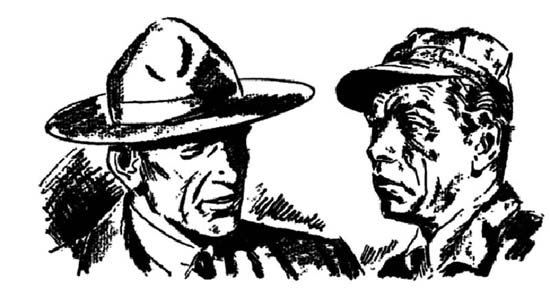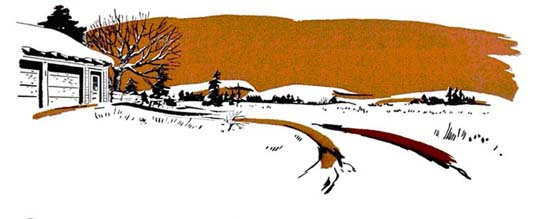February 1951
GUS PARLAYS A
PAIR OF HUNCHES
by Martin Bunn
A knocking engine leads Gus to a clue
that helps Sergeant Jerry Corcoran solve a brutal murder.

Gus Wilson, sitting at his desk in the Model Garage office, glanced at the local newspaper Stan Hicks had brought, and stopped sipping his midmorning coffee. A bold, black headline streamed across the top of the front page: FARM COUPLE FOUND MURDERED.
The story went on to tell how old man Bowen and his wife, both of whom Gus had known fairly well, had been murdered and robbed the night before at their farm not far from town. A hired hand had discovered the crime when he returned from the movies at about 10:30 and had notified the State Police. By 11:45, three suspects had been rounded up and were being held for questioning. The story also said that the Bowens' 25-year-old daughter, Elaine, blind since birth, was in a hospital down in the city awaiting a series of operations that might restore her sight.
As Gus re-read the news account, he heard the repair-shop door open and close. Sergeant Jerry Corcoran of the State Police came in, stamping his feet to knock the snow off his boots.
"What are you doing here, Jerry?" Gus called through the open office door. "According to the papers, you fellows have a double murder on your hands."
"Plus a robbery," grumbled Jerry. "And things aren't getting any too easy either."
"Cup of coffee?" Gus asked.
"I sure could use one," Jerry agreed, unbuttoning his heavy coat. "I haven't been to bed yet."
When the trooper had poured himself a steaming cup of brew and settled on one corner of the desk Gus asked, "When do you suppose this thing happened?"
"That's one thing we do know," explained Jerry. "As near as we can reconstruct it, the old man got it first in the kitchen. Evidently there was a struggle and the cord of the electric clock got pulled out. It was stopped at exactly one minute after 10. Then it looks like his wife got hers trying to stop the robbers from making their get-away. Her body was in the snow outside the front door beside the driveway. Cause of death in both cases: bashed in skulls."
"Did the murderers get much?" asked Gus.
"Don't know yet, but unfortunately the Bowens, like too many old farmers, didn't believe in banks or bonds. The rumor is that everything they had, which could have been plenty, was hidden in the cellar. Those operations they had arranged for their daughter were to cost several thousand, so there must have been at least that much."
"How about these suspects?" asked Gus, pointing to the newspaper.
"Three young punks from the city," replied Jerry. "One of our road blocks gathered them in about 15 miles out of town."
Gus poured himself another cup of coffee. "Got enough to hang it on 'em?"
"Not yet. For one thing we didn't find any money on them or in their car, and they've an alibi we haven't been able to break yet."
"What's their story?" asked Gus.
"Well, if you remember, it stopped snowing last night at about 9:45, so when we got to the Bowen farm the snow on that back road was still fresh. There was just one set of tracks, made by V-type tread snow-and-mud tires, the same kind of tires we found on the suspects' car, in and out of the driveway. The Vs in the snow showed that the car had entered the drive-around from the south -- that's from the town side -- and left toward the north. We followed the tracks up the back road for quite a distance."
Gus nodded.
"So far, so good. Now comes the fly," Jerry continued. "Sam Trayton, who runs that all-night eatery on the main road near town, says the men we're holding stopped at his place about 10:25."
"I don't follow you," interrupted Gus.
"Okay, let's look at the facts. We are sure that the murders were committed at about 10 o'clock. Tire marks show that the murder car sped off to the north. Yet, Trayton, who certainly has no ax to grind, says the suspects were in his place, which is south of the Bowen farm, twenty minutes later."
"Did you . . . ." started Gus.
"Yes, we did," finished Jerry. "And we found that it takes a good 20 minutes to drive south from the Bowen farm to Trayton's, so they couldn't possibly have driven north and doubled back by way of the main road -- an extra 10 miles -- and make it by 10:25."
"Found the murder weapon yet?"
"Nope," replied Jerry. "That's another hitch. And I'm not helping to find it sitting here jawing with you," he added, buttoning his coat.
"And I'm not solving my mystery, either," put in Gus.
"Your mystery?"
"Yeah, the mystery of the engine that knocks when it shouldn't," explained Gus, jerking his thumb toward a coupe on the repair-shop floor. "Regular customer brought it in this morning. Claims his motor only knocks when you start it, stop it, or idle it. Runs perfectly otherwise. Swears there's no knock at all under a load."
"Well, I hope you have better luck with your mystery than I've had with mine so far," Jerry grumbled as he walked toward the shop doors.
Gus soon forgot about Jerry Corcoran's troubles when he got down to digging into his own. Gus started and stopped the engine with the mysterious knock. He idled it. He gunned it. The customer had been right. The engine ran smoothly and without a sign of a knock at high speed, but grumbled when it was idled, just after it was started, or when the ignition was turned off. When the knock was there, it sounded just like a bearing that was shot.
Stan, who'd been smoothing out the wrinkles in a fender on another car, came over to where Gus was working. He got a kick out of watching the old mechanic methodically discard one possibility after another when he was tracking down motor troubles.
"Got you stumped?" he asked with a grin.
"Not yet it hasn't," Gus grunted, waking over to his bench and picking up a long-handled screwdriver. "I've a hunch this 'knock' isn't a knock at all."
Using the shank of the screwdriver as a connector, Gus proceeded to short out each of the spark plugs in turn, while the engine was idling -- and knocking. The knock persisted, which was almost a sure sign that it wasn't a bearing knock.
As Stan watched, Gus rolled his creeper over, settled his bulky frame on it, and maneuvered it and himself under the front end of the car. But he had no more than disappeared than he reappeared.
"Stan," he said as he got up off the creeper. "Hold the fort for a while, will you? I want to see Jerry over at the police barracks. I'll finish up this job when I get back." With that, he grabbed up his coat and hat and disappeared through the shop doors.
Ten minutes later, the veteran garage man was escorted into the police squad room where Sergeant Jerry Corcoran had his desk.
"It's just a hunch, Jerry," Gus began, "but have you thought of the possibility that those snow tires could have been put on the murder car backwards -- you know, deliberately, with the Vs pointing to the rear instead of toward the front so the tracks would look like they were going when they actually were coming?"
Jerry smiled. "Sorry, Gus, but the lab boys gave that one a whirl too, but when we picked up the men and the car the tires were on with the Vs pointing forward at the top. And nobody goes around switching wheels in the dark on snow-covered roads. That job is pretty tough without a big jack like you've got at that garage. They wouldn't have had the time."
"Maybe you're right," Gus agreed grudgingly. "Just a thought. Now I've got one more screwy idea and then I'll stop playing detective and get back to work."
"What is it?" asked Jerry.
"Know that old road-commission shack just off the main road down near Trayton's place?"
"Sure," answered Jerry with a nod.
"Well, just to satisfy my curiosity, Jerry, I wish you'd have a look at it. In good weather, the road-repair boys generally store some of their equipment there and always have a jack and a few tools handy for repairs. I've been thinking it might be a good spot for someone to switch wheels on a snowy night."
"Could be. Your guess is as good as anyone's right now," Jerry admitted. "But I think you're barking up the wrong clue."
Like the same evening, just as Gus was about to close up shop and call it a day, the glare from a pair of headlights flashed across the garage windows and Gus heard a car stop. A few seconds later, the shop door slid open slowly. It was Jerry Corcoran, a broad grin on his face.
"You look like you swallowed something more than a canary," Gus greeted him.
"Gus, our case cracked wide open about a half hour ago," the Sergeant announced. "The suspects confessed."
"How'd you get 'em to do that?"
Jerry shoved his hat on the back of his head and perched himself on a corner of Gus's bench.
"Well, after you left the barracks this afternoon I decided to have a look at that road-gang shack, so I called up the road-commission office and got the key. Then a couple of the boys and I drove over."
Gus listened intently, stoking his pipe with shreds of tobacco.
But the key they gave us didn't fit the lock at all," Jerry continued. "We looked through the windows and the place looked completely empty, but just to be safe, we pried the hasp loose and opened the doors for a look."
"Find anything?" asked Gus.
"Nothing except a burlap sack stuffed with more than eight thousand bucks in bills, a hydraulic garage jack, and a blood-stained tire iron hidden under some loose floor boards," grinned Jerry. "Those birds had planned to cache the money there until the heat was off and they were released. They'd even changed the lock. But thanks to your hunch, we not only got the money but the murder weapon as well, complete with fingerprints."
Gus grinned a satisfied grin.
"Tell me, Gus, what in the world ever gave you that hunch?"
"Remember that car with the knocking engine that I said shouldn't knock?"
Jerry nodded.
"Well, after making all the usual tests, I decided that the knock wasn't in the engine at all, but had something to do with the movement of the engine on its rubber mounts," explained Gus. "So I started to get underneath for a look. As I did, I just happened to notice that the car had snow tires and one of 'em was on the wrong way."
"Clue, or rather hunch, No. 1," put in Jerry.
"Right. Now, it also happened that the car belonged to Ed Johnson -- the road engineer for this district. And that made me think of that old road-gang shack down near Trayton's."
"By the way," asked Jerry, "did you solve the mystery of Johnson's knocking engine?"
Gus reached over on his bench and picked up a small stone. "Found this bedded in a mixture of dirt and road tar on the motor cradle," he explained. "When the engine rocked on its rubber mounts during uneven idling or when it was stopped or started, the engine hit the stone and caused what sounded like a knock. Soon as I pried it loose," Gus added, holding up the out-size pebble, "the 'knock' disappeared."
"Always play your hunches, don't you, Gus?" grinned Jerry.
"Have to in this game," confessed Gus. "Just between you, me, and the gas pumps out there, finding out just what ails a hunk of machinery pretty often is about three-quarters hunch and one-quarter know-how."
"Plus following all your hunches through," added Jerry.
END

